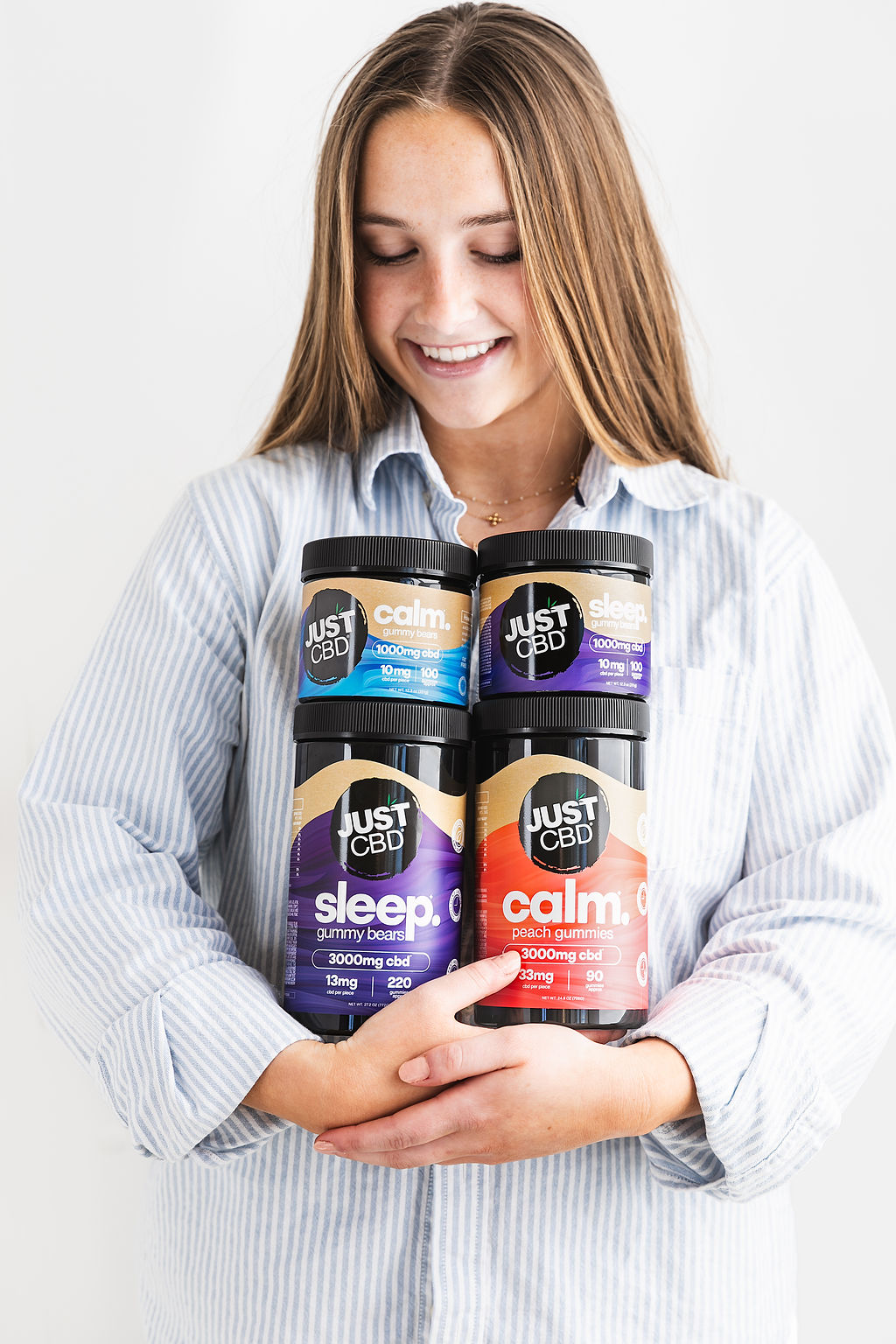Potential Benefits of CBD for Sleep
Millions struggle with sleep issues, searching for natural solutions to improve their rest. Cannabidiol (CBD), a compound found in hemp plants, has gained attention as a potential aid for better sleep. Studies suggest CBD may promote relaxation and reduce anxiety, factors often contributing to sleep difficulties.
How CBD May Promote Sleep
CBD’s potential benefits for sleep stem from its interactions with the body’s endocannabinoid system (ECS), which regulates various functions including sleep-wake cycles.
Some research indicates that CBD may help promote sleep by reducing anxiety and improving overall mood. Anxiety and stress can significantly disrupt sleep patterns, making it harder to fall asleep and stay asleep. By easing these feelings, CBD could potentially create a more conducive environment for restful sleep.
Additionally, CBD might have calming effects on the nervous system, potentially leading to a more relaxed state that promotes drowsiness.
Studies on CBD and Sleep Quality
While research on CBD and sleep is ongoing, some studies suggest potential benefits. For example, a 2019 study published in the journal ” Permanente Journal” found that CBD helped improve sleep quality in patients with anxiety disorders.
Another study, published in the journal “Cannabis and Cannabinoid Research” in 2022, explored the effects of CBD on sleep disturbances associated with Multiple Sclerosis. Researchers observed positive outcomes in terms of improved sleep duration and quality.
It’s important to note that these studies are limited in scope and more research is needed to fully understand the long-term effects and optimal dosage of CBD for sleep enhancement.
Types of CBD Vape Pens
CBD vape pens have emerged as a popular method for consuming CBD, offering a discreet and fast-acting way to experience its potential benefits. These devices come in various forms, each with unique features and strengths. Some common types include disposable vape pens, refillable cartridge vapes, and pod systems.
Full-Spectrum CBD Vape Pens
CBD vape pens have emerged as a popular method for consuming CBD, offering a discreet and fast-acting way to experience its potential benefits. These devices come in various forms, each with unique features and strengths. Some common types include:
- Disposable vape pens
- Refillable cartridge vapes
- Pod systems
Full-spectrum CBD vape pens contain the entire range of compounds found in hemp, including terpenes and other cannabinoids alongside CBD. This entourage effect is believed by some to enhance the overall therapeutic benefits of CBD.
Broad-Spectrum CBD Vape Pens
Broad-spectrum CBD vape pens are similar to full-spectrum vape pens but without THC. They contain a wide range of hemp-derived compounds except for THC, offering potential synergistic benefits from the combined action of various cannabinoids and terpenes.
These vape pens may be preferred by individuals who wish to avoid any psychoactive effects associated with THC while still experiencing the potential entourage effect of multiple cannabinoids.

Isolate CBD Vape Pens
Isolate CBD vape pens contain only pure CBD, without any other hemp-derived compounds.
- Full-spectrum CBD vape pens
- Broad-spectrum CBD vape pens
- Isolate CBD vape pens
Using CBD Vape Pens for Sleep
Millions struggle with sleep issues, searching for natural solutions to improve their rest. Cannabidiol (CBD), a compound found in hemp plants, has gained attention as a potential aid for better sleep.
Studies suggest CBD may promote relaxation and reduce anxiety, factors often contributing to sleep difficulties.
CBD’s potential benefits for sleep stem from its interactions with the body’s endocannabinoid system (ECS), which regulates various functions including sleep-wake cycles.

Dosage Considerations
When considering using CBD vape pens for sleep, dosage is a crucial factor. Individual responses to CBD can vary widely depending on factors such as body weight, metabolism, and the severity of sleep issues. It’s important to start with a low dose and gradually increase it until you find what works best for you.
A good starting point for beginners is typically 5-10 milligrams (mg) of CBD. You can then adjust this amount based on your experience and desired effects. Remember that more is not always better, as excessive CBD consumption can lead to unwanted side effects like drowsiness or fatigue.
It’s recommended to consult with a healthcare professional before using CBD, especially if you have any underlying health conditions or are taking medications. They can help determine the appropriate dosage and guide you on safe usage practices.
Choosing the Right Strain
Choosing the right strain of CBD for sleep depends on individual preferences and desired effects. Some strains are known to promote relaxation and sleepiness, while others may have energizing properties.
For sleep enhancement, look for strains that are high in calming cannabinoids like CBD and potentially CBN (cannabinol), which is believed to have sedative effects. Terpenes also play a role in influencing the overall experience, with some promoting relaxation and others uplifting.
Popular choices for sleep include strains known as “Sleepy,” “Nighttime,” or “Relax.”
Timing of Consumption
Timing your CBD vape pen consumption is important for maximizing its potential benefits for sleep.
- Before Bed: Vaping CBD 30-60 minutes before bedtime may help induce relaxation and prepare your body for sleep.
- At the First Sign of Sleep Trouble: If you have trouble falling asleep, vaping a small dose of CBD can help calm your mind and reduce anxiety that might be keeping you awake.
Potential Side Effects and Risks
While CBD shows promise as a sleep aid, it’s crucial to be aware of potential side effects and risks associated with its use. These can include drowsiness, fatigue, dry mouth, changes in appetite, diarrhea, and dizziness. Some individuals may also experience anxiety or paranoia, especially when using high doses or certain strains of CBD.
CBD’s Interaction with Medications
CBD’s interaction with medications can be complex and requires careful consideration. CBD can potentially interact with various drugs, including those for blood pressure, antidepressants, and anti-anxiety medications. It’s important to consult with a healthcare professional before using CBD if you are taking any medications to assess potential interactions and risks.
- Always inform your doctor about all the substances you consume, including CBD products, to ensure safe and effective treatment.
- Be aware that CBD can affect the metabolism of certain drugs, potentially altering their effectiveness or increasing side effects.
Respiratory Irritation
CBD vape pens have gained popularity as a method for consuming CBD, but potential risks should be considered. One common concern is respiratory irritation. Inhaling any substance, including CBD vapor, can potentially irritate the lungs and airways, especially in individuals with pre-existing respiratory conditions such as asthma or COPD.
Prolonged use of vape pens can lead to inflammation and damage to the lung tissue, increasing the risk of respiratory infections and other complications. It’s important to note that the quality of CBD products can vary significantly. Some vape pens may contain additives or contaminants that can further exacerbate respiratory irritation.
Possible Tolerance Build-Up
While CBD shows promise as a sleep aid, it’s crucial to be aware of potential side effects and risks associated with its use. These can include drowsiness, fatigue, dry mouth, changes in appetite, diarrhea, and dizziness. Some individuals may also experience anxiety or paranoia, especially when using high doses or certain strains of CBD.
CBD’s interaction with medications can be complex and requires careful consideration. CBD can potentially interact with various drugs, including those for blood pressure, antidepressants, and anti-anxiety medications. It’s important to consult with a healthcare professional before using CBD if you are taking any medications to assess potential interactions and risks.
CBD vape pens have gained popularity as a method for consuming CBD, but potential risks should be considered. One common concern is respiratory irritation. Inhaling any substance, including CBD vapor, can potentially irritate the lungs and airways, especially in individuals with pre-existing respiratory conditions such as asthma or COPD. Prolonged use of vape pens can lead to inflammation and damage to the lung tissue, increasing the risk of respiratory infections and other complications. It’s important to note that the quality of CBD products can vary significantly. Some vape pens may contain additives or contaminants that can further exacerbate respiratory irritation.
The potential for tolerance build-up with CBD use is an emerging area of research. While some individuals might experience a gradual decrease in effectiveness over time, others may not develop tolerance at all. Factors like dosage, frequency of use, and individual physiology can influence the likelihood of developing tolerance.
Legality and Regulations
Navigating the world of CBD products requires an understanding of legal frameworks and regulations. Laws surrounding CBD vary significantly depending on location and the specific product form. It’s crucial to research and adhere to the regulations in your jurisdiction to avoid potential legal complications.
Federal Law in the US
Federal law in the United States regarding CBD is complex and has evolved over time. The 2018 Farm Bill legalized the cultivation and sale of hemp-derived CBD products containing less than 0.3% THC at the federal level.
Prior to this, CBD was largely considered a Schedule I controlled substance under the Controlled Substances Act due to its association with marijuana. However, the Farm Bill’s passage shifted the legal landscape for hemp and CBD.
Currently, federally legal hemp-derived CBD products are generally allowed in interstate commerce and can be sold online and in stores across most states. However, some states have their own regulations that may be more restrictive than federal law.
It is essential to note that while hemp-derived CBD is legal at the federal level, products containing marijuana-derived CBD or exceeding 0.3% THC are still considered illegal under federal law.
Consumers should always carefully check product labels and source their CBD from reputable companies that comply with all applicable regulations.
State-Specific Laws
State laws regarding CBD vary widely. Some states have embraced CBD, legalizing its sale and use in various forms, including vape pens. Others maintain stricter regulations, limiting access or prohibiting certain types of CBD products.
It is crucial for individuals to research the specific laws in their state before purchasing or using any CBD products. Information regarding CBD legality can often be found on state government websites or through legal resources dedicated to cannabis and hemp-derived products.
Compliance with state regulations is essential to avoid legal consequences.
Alternative Sleep Aids to Consider
For those seeking natural sleep aids, CBD has emerged as a potential solution. Millions struggle with sleep issues, and CBD, derived from hemp plants, shows promise in promoting relaxation and reducing anxiety, factors often linked to sleep difficulties.
Sleep Hygiene Practices
For those who prefer alternatives to traditional sleep medications or simply want to explore natural options, several strategies can help improve sleep quality.
Practicing good sleep hygiene is fundamental for establishing a healthy sleep pattern. This involves creating a conducive environment for sleep and adopting routines that promote relaxation and prepare the body for rest.
- Consistent Sleep Schedule: Stick to a regular sleep-wake cycle, even on weekends, to regulate your body’s natural sleep-wake rhythm (circadian rhythm).
- Create a Relaxing Bedtime Routine: Wind down an hour or two before bed with calming activities such as taking a warm bath, reading a book, or listening to soothing music.
- Optimize Your Sleep Environment: Make sure your bedroom is dark, quiet, and cool. Use blackout curtains, earplugs, or a white noise machine to minimize distractions.
- Limit Screen Time Before Bed: The blue light emitted from electronic devices can interfere with melatonin production, a hormone that regulates sleep.
- Avoid Caffeine and Alcohol Before Bed: These substances can disrupt sleep patterns and prevent restful sleep.
Other alternative sleep aids worth considering include:
- Melatonin Supplements: Melatonin is a hormone naturally produced by the body to regulate sleep-wake cycles. Taking a melatonin supplement can help reset your circadian rhythm and improve sleep quality.
- Magnesium:** This mineral plays a role in muscle relaxation and nerve function, which can contribute to better sleep. Magnesium supplements or foods rich in magnesium, such as almonds, spinach, and dark chocolate, may be beneficial.
- Chamomile Tea: Known for its calming effects, chamomile tea can promote relaxation and help prepare the body for sleep.
- Lavender Essential Oil: The scent of lavender has been shown to have a relaxing effect on the mind and body, potentially aiding in sleep.
Melatonin Supplements
Melatonin supplements can be an effective option for improving sleep quality. Melatonin is a hormone that regulates the body’s natural sleep-wake cycle. Taking a melatonin supplement can help synchronize your internal clock, making it easier to fall asleep and stay asleep.
When choosing a melatonin supplement, it’s important to consider the dosage. A typical starting dose is 0.5 to 5 milligrams (mg), taken about 30 minutes to an hour before bedtime. However, individual responses to melatonin vary, so it may take some experimentation to find the right dosage for you.
It’s also essential to follow the instructions on the supplement label carefully and consult with a healthcare professional if you have any concerns or underlying health conditions.
Other Natural Remedies
Alternatives to traditional sleep medications are gaining popularity, and many people are turning to natural remedies to improve their sleep quality.
Besides CBD, several other options can be explored:
* **Melatonin:** This hormone regulates the body’s natural sleep-wake cycle. Taking a melatonin supplement can help reset your circadian rhythm, making it easier to fall asleep and stay asleep.
* **Magnesium:** Magnesium plays a role in muscle relaxation and nerve function, which are essential for good sleep. You can find magnesium in foods like almonds, spinach, and dark chocolate, or consider taking a magnesium supplement.
* **Chamomile Tea:** Known for its calming properties, chamomile tea can promote relaxation and help prepare the body for sleep.
* **Lavender Essential Oil:** Lavender’s scent has been shown to have a relaxing effect on both the mind and body, potentially aiding in sleep.
Practicing good sleep hygiene is also crucial for improving your sleep. This includes maintaining a consistent sleep schedule, creating a relaxing bedtime routine, optimizing your sleep environment (making it dark, quiet, and cool), and limiting screen time before bed. Avoiding caffeine and alcohol close to bedtime can also help.
Shop CBD vape pens for ultimate comfort
- Downturned Smile Treatment Near Englefield Green, Surrey - May 5, 2025
- Can CBD Vape Pens Help You Sleep Better At Night? - May 4, 2025
- Jowl Treatment Near Chessington, Surrey - May 3, 2025
